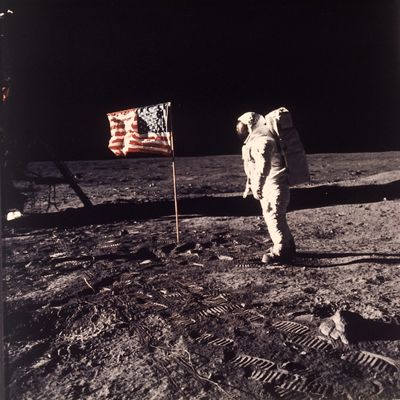Paul Turner: Moon landing brought wonder and … relief

Everyone thought about it.
Maybe you didn’t dwell on it. But it had to cross your mind.
What if something goes wrong? What if they get stuck up there?
How will we ever be able to look at the moon again?
Presidential speechwriter William Safire had even prepared some somber remarks for Richard Nixon to deliver to the nation in that tragic eventuality.
I bring this up because I know many readers were not around in July of 1969. And it’s worth noting that the excitement and pride regarding Apollo 11 some 50 years ago was tinged with other feelings: worry and, eventually, profound relief.
Maybe you had to be there. We all know what role the moon had come to play as a silent backdrop for summer nights filled with drive-ins, romance and walks on the water’s edge serenaded by popular songs of the day.
But that July had an extra added attraction. Americans were going to do something that had never before been attempted.
Even those lost in their own self-absorbed world – I’m looking at you teenagers of that era – had to note the monumental moment looming just over the horizon.
Wherever you were, it made you get out a pair of binoculars and aim them at the night sky. Just to wonder. And prepare to go back inside and behold that small step/giant leap.
Just think. We’re going to be up there and actually walk around. Americans. Far out.
It was all pretty mind-blowing.
But always there was the grim, almost unthinkable prospect that something would go wrong. You did not have to be a space buff to remember that there had been setbacks and deaths before.
So that first step on the moon by a guy from Ohio was going to be beyond huge. No question.
Can you imagine? Footprints on the lunar surface.
It would be a moment to celebrate. A moment for the ages.
But then, when the euphoria died down, there would be anticipation of another event. The kind some would approach with clenched anxiety. What if they pressed the button to launch themselves back off the desolate surface of the moon and nothing happened?
If you are old enough to remember that summer, you undoubtedly recall how virtually the whole world and the people gathered in your living room had fingers crossed for Armstrong and Aldrin.
You didn’t have to be especially religious to offer a silent prayer, along with millions of others thinking the exact same thing.
Please, please, please, don’t let them be stranded so far from home.
If the moon had become a memorial, summer nights might have been changed forever. Every glimpse of the timeless white sphere above would be a haunting reminder.
It’s one thing to visit battlefields or disaster sites and contemplate the scenes of carnage. Those images in your own head never really leave you.
But you probably aren’t reminded of it every time you step outside after dark. You don’t replay what would have been the astronauts’ famous last words to Houston before the batteries finally faded, the lights on their control panel grew dim and everything went silent.
Many have wondered. How long would our mourning have been a thing? How long would glancing up at the night sky have been a stabbing reminder of their last days?
How many years would go by before we looked at the moon and stopped trying to imagine what it was like for Collins up in the Command Module? How many years would go by before we stopped thinking about Armstrong ordering him to leave lunar orbit and head home? Alone.
Perhaps your reaction to gazing at the heavens would depend on your connection to Apollo 11. If you had been one of those spectators with fingers crossed, you might feel the impulse to salute every time you saw the moon until the end of your days.
If that mission was already a chapter of history by the time you were born, it might not resonate in quite so personal a way.
Anniversaries can be funny things. When later this month we note the passing of 50 years since the moon landing, it might be understandable if some dismiss Apollo 11 as a nerdy adventure about which there was never any doubt.
But that’s not how some of us remember it.
When Armstrong took his televised walk, an untold number of us back here on Earth shook hands. Not because we had anything to do with the moon mission. But because we didn’t know what else to do.
When the astronauts headed home and everything seemed to be going according to plan, we exhaled. Had it all the way, some of us joked.
Looking up at the night sky would never be the same. And that was such a happy thing.
Just wondering
Does your cat look forward to Amazon deliveries so he or she can get in the box after you open it?
Columnist Paul Turner can be reached at srpaulturner@gmail.com.